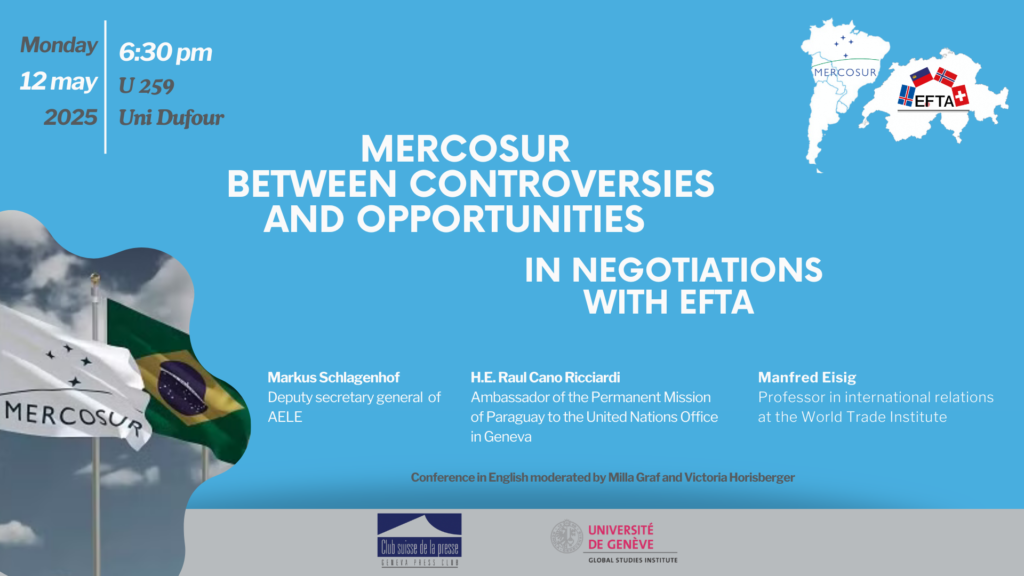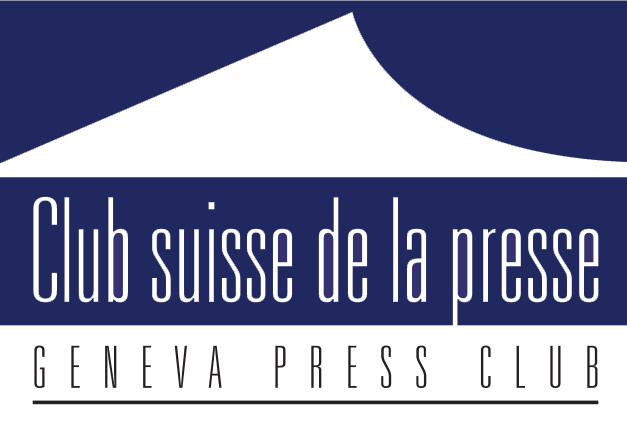Mercosur between controversies and opportunities, in negotiation with EFTA

Mercosur between controversies and opportunities, in negotiation with EFTA
The Geneva Press Club and the BARI “project management course” at the University of Geneva’s Global Study Institute are pleased to invite you to a roundtable discussion with :
- Markus Schlagenhof, Deputy Secretary General of EFTA
- Manfred Eisig, Professor of International Relations at the World Trade Institute (UNIBE)
- His Excellency Cano Ricciardi, Ambassador of the Permanent Mission of Paraguay to the United Nations Office and other International Organisations in Geneva
Moderation : Milla Graf, Victoria Horisberger, BARI students at the University of Geneva
Event open to the public.
Mercosur and EFTA have been negotiating a free trade agreement since June 2017. In 2019, during the 10th round of negotiations, a substantial agreement was reached. However, the negotiations have dragged on ever since. On 28 March 2025, the 12th round of negotiations was held in Buenos Aires. The parties reaffirmed their desire to reach an agreement by the end of the year.
At the same time, Mercosur was also negotiating a free trade agreement with the European Union. In December 2024, the negotiations came to an end with the conclusion of an agreement. However, the agreement is far from being ratified by the Union. France is firmly opposed to it, denouncing in particular the impact it will have on its agriculture.
But what about the agreement with EFTA ? The EFTA agreement has gone unnoticed in the face of the wave of consternation over the agreement with the EU. The content of the negotiations is still a secret. Although the commercial objectives have been set out, such as easier access to Mercosur markets for Swiss service providers and the overall strengthening of bilateral economic relations, it is difficult to find more information about this agreement. The considerable delay in these negotiations raises even more questions about their content. Now that the agreement between the EU and Mercosur has been finalised, will this motivate EFTA to do the same ? Will the international instabilities in terms of cooperation and trade caused by the Trump administration prompt the establishment of new alliances like the one between Mercosur and the European countries ?
Manfred Elsig, Professor of International Relations at the World Trade Institute, seems to have a positive answer to this question. He argues in particular : “The problems with access to the US market and the uncertainties of US trade policies can certainly give a positive boost to the negotiations/ratifications. Switzerland, either on its own or as a member of EFTA, will certainly continue to expand its network of free trade agreements (and modernise the old ones).”
On 12 May 2025 at the University of Geneva, Manfred Elsig, Markus Schlagenhof (Deputy Secretary General of EFTA) and Mr Cano Ricciardi (Ambassador of the Permanent Mission of Paraguay) will meet to discuss this agreement. Mr Cano Ricciardi and Mr Schlagenhof will bring their expertise as people who took part directly in the negotiations. As for Mr Elsig, he will give us the benefit of an external viewpoint from a specialist in international relations, particularly on the political and economic dimensions of trade
To find out more about an agreement that the general public knows too little about, an exhibition will be open to the public from 12 to 16 May in the hall of Uni Dufour (Rue du Général-Dufour 24, 1204 Geneva). Through 7 informative panels, come and discover the history, key data and current issues of Mercosur today.
In a world where the economic balance is being upset by the questioning of major trade alliances and the rise of protectionism, regional agreements such as Mercosur are emerging as possible alternatives to the major traditional free-trade economic markets.
Created by the Treaty of Asunción in 1991, Mercosur or ‘Mercado commún del Sur’ is an economic market that alone accounts for more than 82.3% of Latin America’s GDP. Initially established between Argentina, Brazil, Paraguay and Uruguay, the agreement is increasingly asserting its position as the most dynamic and competitive industrial platform in the southern hemisphere.
More than just a trade alliance, MERCOSUR aims to achieve regional economic integration. The agreement provides for the free movement of goods and services, the introduction of a common external tariff, the gradual abolition of customs duties between members, and the coordination of macroeconomic policies. A common policy towards third countries and the gradual harmonization of national legislation reinforces the ambition of an integrated market. While negotiations between Mercosur and the European Union are proving highly controversial, talks with EFTA (the Europea Free Trade Association) are making progress. The agreement is currently in the eighth round of negotiations and could be signed later this year.
As part of the ‘Latin America, a laboratory for the political and climatic challenges of the 21st century’ series, the Global Studies Institute (UNIGE), in partnership with the Swiss Press Club, is organizing a round table devoted to the opportunities and controversies associated with this Mercosur agreement. Scheduled for 12 May 2025, this event will provide an opportunity to discuss and debate the major issues at stake in this regional economic area.
